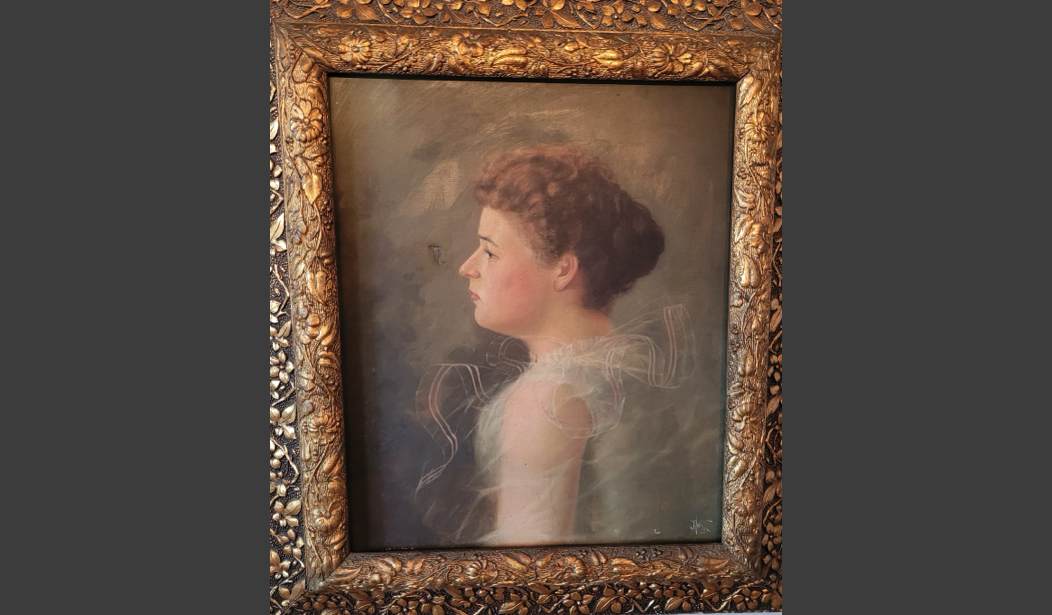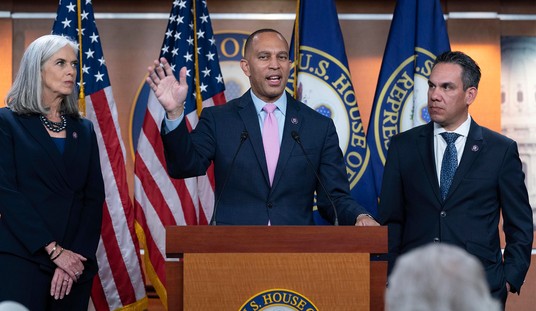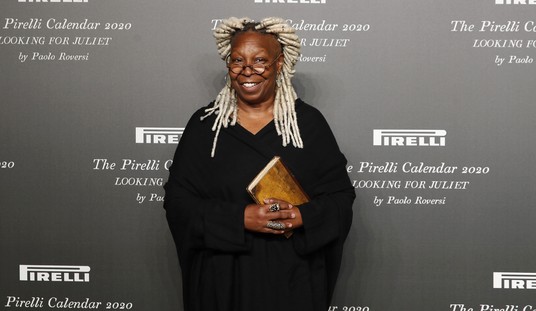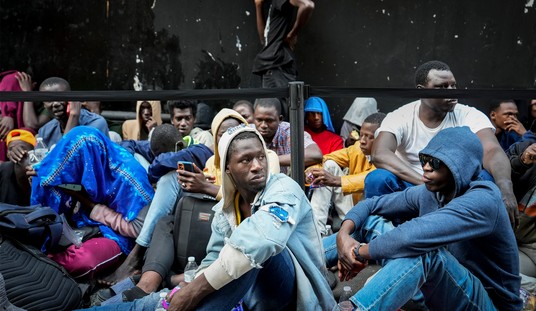I called her Daddam because I couldn’t say Grandma.
From a small child’s perspective, she was a large, warm, bosomy woman who couldn’t keep her hands off her only little grandson. I pretended to flee all the tickling, but inevitably returned within easy reach.
She could have just stepped out of some 19th Century oil painting, which, in fact, she did when her professional-artist father created one of her that now hangs in my home.
Hers was a well-to-do family of artsy people, painters, and an opera singer. She had married a successful haberdasher in an era when no man or woman went out without some kind of stylish head-covering.
The Great Depression completely changed that and their lives, as it did for so many millions. They lost the store, my mother dropped out of university to work in a department store, and my grandparents ended up as a hardworking farm couple in rural Ontario.
My grandmother was indulgent with me, as she had not been with her daughter.
One long-ago day, Grandma overheard the young woman decline a date with a handsome young man because she had a fictitious obligation to take her mother to a church dinner.
When that next Sunday arrived, Grandma made her daughter go along to that church dinner to live up to her lie. Mom eventually agreed to another date request, which was good for me since they married, and he became my father.
They moved to what in Canada was called The States, where the Depression ended sooner. Eventually, I was born an automatic American.
Every year, right about this time, just before the holidays, Grandma would arrive by train on a cold northeastern Ohio evening when snowfalls were common. I would sit next to her in the backseat as Dad drove us around in our Plymouth to see Christmas lights in familiar neighborhoods. Or neighbourhoods, as Grandma would put it
Those were special, safe moments with her, as I believe grandparent-time was meant to be. I’d snuggle up next to the fur coat in the dark car. She’d have her arm around me with no tickling danger, and we would ooh and aah together at the colored lights.
The tickling thing became a ritual between us. Looking back, I realize now I developed the same thing with my little boys and then, with their little children.
In the days before commercial aviation, my family took trains on longer trips. During one such journey, we were riding in the observation car of a New York Central train when I saw something shiny under the radiator across the aisle. I reached in. My mother said, “Get your hand out of there. It’s dirty.” And I pulled out a dime. Actual money.
The incident had everything a child loves. Buried treasure. Discovering it before anyone else. Real money. Outsmarting adults.
I began telling that story at every opportunity. And retelling it. And re-retelling it. That must have been quite tiresome. But Grandma turned it into a game.
As soon as I began, "One time..." she would say, “I’ve heard this before.” And begin tickling me furiously to stop.
So, I had to tell it real fast:
OnetimeinaNewYorkCentralobservationcarIlookeddownandsawsomethingshinyundertheradiatorIreachedinMymothersaid’Get your handoutofthereIt’sdirty’AndIpulledoutadime.
If I finished the hasty story without collapsing from tickles, I won. If I collapsed in laughter before the end, Grandma won.
But that didn’t really matter one little bit because, in a few moments, I started the whole thing over.
We spent part of every summer in my grandparents' farmhouse. I liked it there. It was nicely different, slower, less crowded. Canada also had Macintosh's Toffee, Neilson's Jersey Milk bars, and money with a girl's picture on it.
On our arrival late at night after a long day's drive, Grandma would make me all the jammed toast I could eat in her old-fashioned toaster with the little doors that opened and flipped the bread over.
Then, I’d fall asleep upstairs, leaning against the cool plaster wall and feeling the reassuring rumble of trains passing nearby.
In the morning, I had chores, mainly feeding and watering Grandpa’s chickens. If he had errands, I’d ride along in his trusty 1932 Deuce Coupe. The doors locked with sliding steel bolts. The windows were lowered with leather straps. The trunk lid came off for extra cargo.
In the evenings, he and I would walk a couple hundred yards to the train station to experience those steaming monsters blast past up close. If I waved, engineers blew the whistle. A few ashes might drift down onto my butterscotch ice cream cone, but I didn’t care.
Years later, I experienced a magic surprise. I was on a train from New York City to Toronto. Staring idly out the window, chin on my hand, suddenly that old station flashed by, and there behind the general store was Grandma’s house.
Every summer, she and I had a city day together. We’d take the bus from her sandy road to the city limits to get on the street car all the way downtown.
At Eaton’s Department store, I could select a new toy. We had a fancy lunch together with linen napkins. We went to a movie then, usually starring Jerry Lewis. Then to complete the circuit of transportation modes, we took a train home with a chugging steam engine.
Hard to top days like that.
But one summer, Grandpa acted differently. He could be showing me how to whittle a whistle on the porch, when he’d suddenly stop talking and just stare. He might mumble something that made no sense. If I asked a question, he could get very angry and yell.
Ten minutes later, Grandpa would find me and apologize. “Grandma says I was yelling at you. I’m sorry. I didn’t mean to.”
I was OK. Mom had explained it was something that sounded like hearting of the arteries.
That fall, Grandpa died. At the funeral, our small family was ushered before the mourners to the open casket for a last look. I had never seen Grandpa in a suit and tie. My mother was sobbing.
Of course, I watched Grandma closely. She was very quiet and sturdy. She reached in and straightened a lock of her husband’s hair to where it should be. She could control that.
Grandma spent more time at our house after that. She was in bed quite a bit, which seemed unusual. Mom said she was sick.
In health class, I asked about stomach cancer. The nurse was gentle, but I got the impression that in those days, you didn’t get better.
Sure enough, that’s what happened. Mom dressed me in my nice clothes, and they both led me into the hospital room. Grandma was no longer sturdy.
She was just lying there, looking awful. She was the wrong color. All wrinkled. She was wrapped in a sheet under her arms with a weird light streaming down. And she was motionless. Not talking. Eyes barely open. Grandpa had looked much better in his coffin.
I had no idea what to say at such a time.
So, I just blurted, “How ya doing, Daddam?”
Mom gasped a little. Grandma said nothing. Despite all the tubes, I took her frail hand off the sheet and held it tight as she had mine so often. I leaned down close by her ear.
And I whispered to her a story about a little boy who was riding a train when he saw something shiny under the radiator and reached in and his mother said get your hand out of there it’s dirty and the little boy pulled out a dime.
And Grandma tickled my hand.
__________________
This is the 11th in an occasional series of personal Memory posts. The others are below. I hope they trigger your own memories to share in the Comments.
Practicing Journalism the Old-Fashioned Way
When Hal Holbrook Took a Day to Tutor a Teen on Art
The Night I Met Saturn That Changed My Life
High School Was Hard for Me, Until That One Evening
When Dad Died, He left a Haunting Message That Reemerged Just Now
My Father's Sly Trick About Smoking That Saved My Life
His Name Was Edgar. Not Ed. Not Eddie. But Edgar.














Join the conversation as a VIP Member